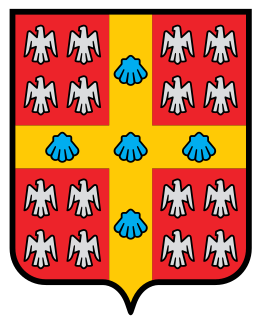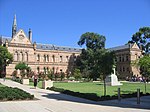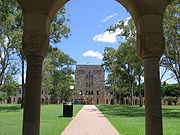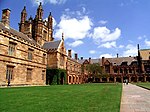Related Research Articles

Université Laval is a public research university in Quebec City, Quebec, Canada. The University was founded by royal charter issued by Queen Victoria in 1852, with roots in the founding of the Séminaire de Québec in 1663 by François de Montmorency-Laval, making it the oldest centre of higher education in Canada and the first North American institution to offer higher education in French. The university, which started in Old Québec, moved to a new campus in the 1950s in the suburban borough of Sainte-Foy–Sillery–Cap-Rouge. It is ranked among the top 10 Canadian universities in terms of research funding and holds 4 Canada Excellence Research Chairs. Like most institutions in Quebec, the name "Université Laval" is not translated into English.
The University of Wollongong is an Australian public research university located in the coastal city of Wollongong, New South Wales, approximately 80 kilometres south of Sydney. As of 2017, the university had an enrolment of more than 32,000 students, an alumni base of more than 131,859 and over 2,400 staff members.
The Australian Research Council (ARC) is the primary non-medical research funding agency of the Australian Government, distributing more than A$800 million in grants each year. The Council was established by the Australian Research Council Act 2001, and provides competitive research funding to academics and researchers at Australian universities. Most health and medical research in Australia is funded by the more specialised National Health and Medical Research Council (NHMRC), which operates under a separate budget.
The National Health and Medical Research Council (NHMRC) is the main statutory authority of the Australian Government responsible for medical research. It was the eighth largest research funding body in the world in 2016, and NHMRC-funded research is globally recognised for its high quality. Around 45% of all Australian medical research from 2008–12 was funded by the federal government, through the NHMRC.
The Centre for Ultrahigh bandwidth Devices for Optical Systems is a collaboration of Australian and international researchers in optical science and photonics technology. CUDOS is an Australian Research Council Centre of Excellence and was formally launched in 2003.
The Free Radical Centre or ARC Centre of Excellence for Free Radical Chemistry and Biotechnology was a research centre from 2005 - 2013 that was established in the 2005 Australian Research Council (ARC) grant funding rounds. The centre was administered from the University of Melbourne, and had nodes at six Australian universities: The University of Melbourne, the Victorian Pharmacy College at Monash University, The Heart Research Institute at the University of Sydney, Queensland University of Technology, the University of Wollongong, and the Australian National University in Canberra. The Centre had over 100 researchers working in all areas of free radical chemistry from material science to biology. The centre received an initial grant of $12 million from the ARC in 2005 and a further $9.8 million in 2009. Funding for the centre ended in 2013.
The Climate Change Research Centre (CCRC) is a research initiative established in 2007 at the University of New South Wales. It is the lead node of the Australian Research Council's Centre of Excellence for Climate Extremes (CLEX), and formerly led the ARC Centre of Excellence for Climate System Science (ARCCSS) from 2011 to 2018.
Jane Davidson is Professor of Creative and Performing Arts (Music) at The University of Melbourne and Deputy Director of the Australian Research Council's Centre of Excellence for the History of Emotions.

The ARC Centre for Complex Systems (ACCS) was established in 2004 from a consortium of Australian universities, led by the University of Queensland. The objective of ACCS was to conduct basic and applied research in the field of complex systems. It conducted research into both the science and engineering of complex systems. Funding was provided by the Australian Research Council (ARC) and the universities involved. The ACCS was funded under the ARC's Centre of Excellence Scheme until mid-2009, after which industry collaborations and further funding was established to continue to apply the Centre's research.
William Forde "Bill" Thompson is an academic who has worked in Canada, Sweden and Australia. He is a distinguished professor at Macquarie University in Sydney, Australia, where he was chair of the psychology department between 2009 and 2013. His research focuses on music, emotion, expertise, and performance.
The ARC Centre of Excellence for Creative Industries and Innovation (CCI) was an Australian research centre that undertook research in media studies, cultural studies, communication studies, law, education, economics, business technology, and information technology, related to the creative economy, between 2005 and 2013.
The history of emotions is a field of historical research concerned with human emotion, especially variations among cultures and historical periods in the experience and expression of emotions. Beginning in the 20th century with writers such as Lucien Febvre and Peter Gay, an expanding range of methodological approaches is being applied.
Dominique Clément is a Professor of Sociology at the University of Alberta and a member of the Royal Society of Canada's College of New Scholars, Artists and Scientists. He is a Canadian historical sociologist who specializes in human rights and social movements including the use of digital tools for research in the humanities and social sciences. He is an Adjunct Professor in the Departments of History and Classics as well as Educational Policy Studies at the University of Alberta and the Department of Sociology and Social Anthropology at Dalhousie University. He has also been a visiting scholar at the University of Sydney in Australia, Beijing Normal University in China, KU-Leuven University in Belgium, and NUI Galway in Ireland.

The Richardson Institute for Peace Studies was the first peace & conflict research centre in the UK and one of the first in the world. It is part of the Department of Politics, Philosophy, and Religion at Lancaster University, where its members publish research, hold lectures and workshops, and run academic outreach programmes.
Philippa Catherine "Pip" Maddern was an Australian historian and academic, who was Director of the Australian Research Council's Centre of Excellence for the History of Emotions.
Susan Broomhall is an Australian historian and academic. She is an Australian Research Council Future Fellow and Professor of History at The University of Western Australia, and from 2018 Co-Director of the ARC Centre of Excellence for the History of Emotions (CHE). She was a Foundation Chief Investigator (CI) in the 'Shaping the Modern' Program of the Centre, before commencing her Australian Research Council Future Fellowship within CHE in October 2014, and the Acting Director in 2011. She is a specialist in gender history and the history of emotions.
The ARCCentre of Excellence in Population Ageing Research (CEPAR) is a collaboration of leading researchers in population ageing. CEPAR is an Australian Research Council Centre of Excellence. It was established in 2011. It is based at the University of New South Wales, with further nodes at the Australian National University, Curtin University, University of Melbourne and University of Sydney. CEPAR was the first social science centre to receive Centre of Excellence funding.
The ARC Centre of Excellence for Automated Decision-Making and Society (ADM+S) is a multi-institutional, multi-disciplinary research centre based at RMIT University in Melbourne, Australia. The Centre aims to contribute to the knowledge and strategies necessary for responsible, ethical and inclusive automated decision-making (ADM). It was established in 2020 with funding from the Australian Government through the Australian Research Council (ARC) and other partners. The Centre examines the social and technical aspects of ADM, seeing automated systems as the outcomes of interactions between people, machines, data and institutions. It has a particular focus on the domains of news and media, transport and mobility, social services and health.
Glenda Anna Sluga, is an Australian historian who has contributed significantly to the history of internationalism, nationalism, diplomacy, immigration, and gender, in Europe, Britain, France, Italy, Yugoslavia, and Australia.
References
- 1 2 3 "Director's welcome". About the Centre. ARC Centre of Excellence for the History of Emotions. n.d. Retrieved 4 January 2020.
- ↑ "Table 4. ARC Centre of Excellence 2011 Proposals approved for funding". Selection Report: ARC Centre of Excellence 2011: Approved funding. Australian Research Council, Australian Government. 25 June 2018. Retrieved 4 January 2019.
- ↑ Van Biema, David (19 March 2018). "The Way People Experience Emotion Evolves Over Time. Recognizing That Fact Has Changed Our Understanding of the Past". Time magazine. Retrieved 8 April 2019.
- ↑ "Home page". ARC Centre of Excellence for the History of Emotions. n.d. Retrieved 4 January 2020.
- ↑ "Society for the History of Emotions". ARC Centre of Excellence for the History of Emotions. Retrieved 8 April 2019.




